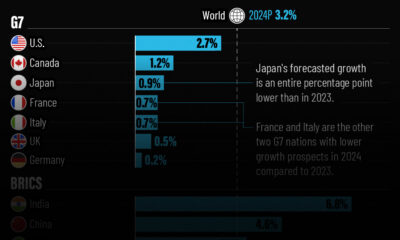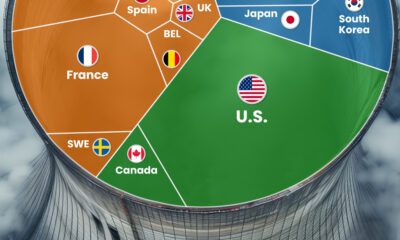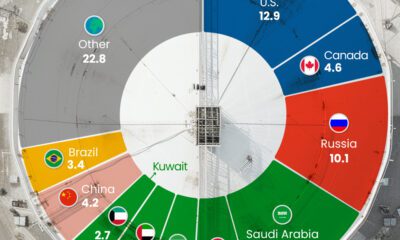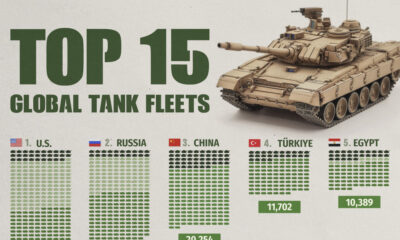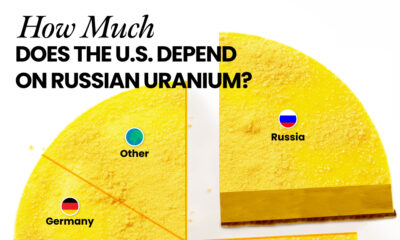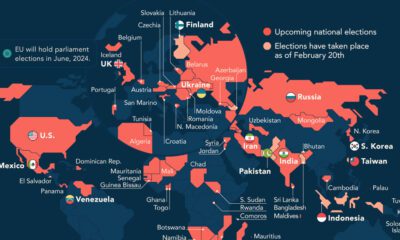Datastream
Russia Has Been Suspended From the UN Human Rights Council
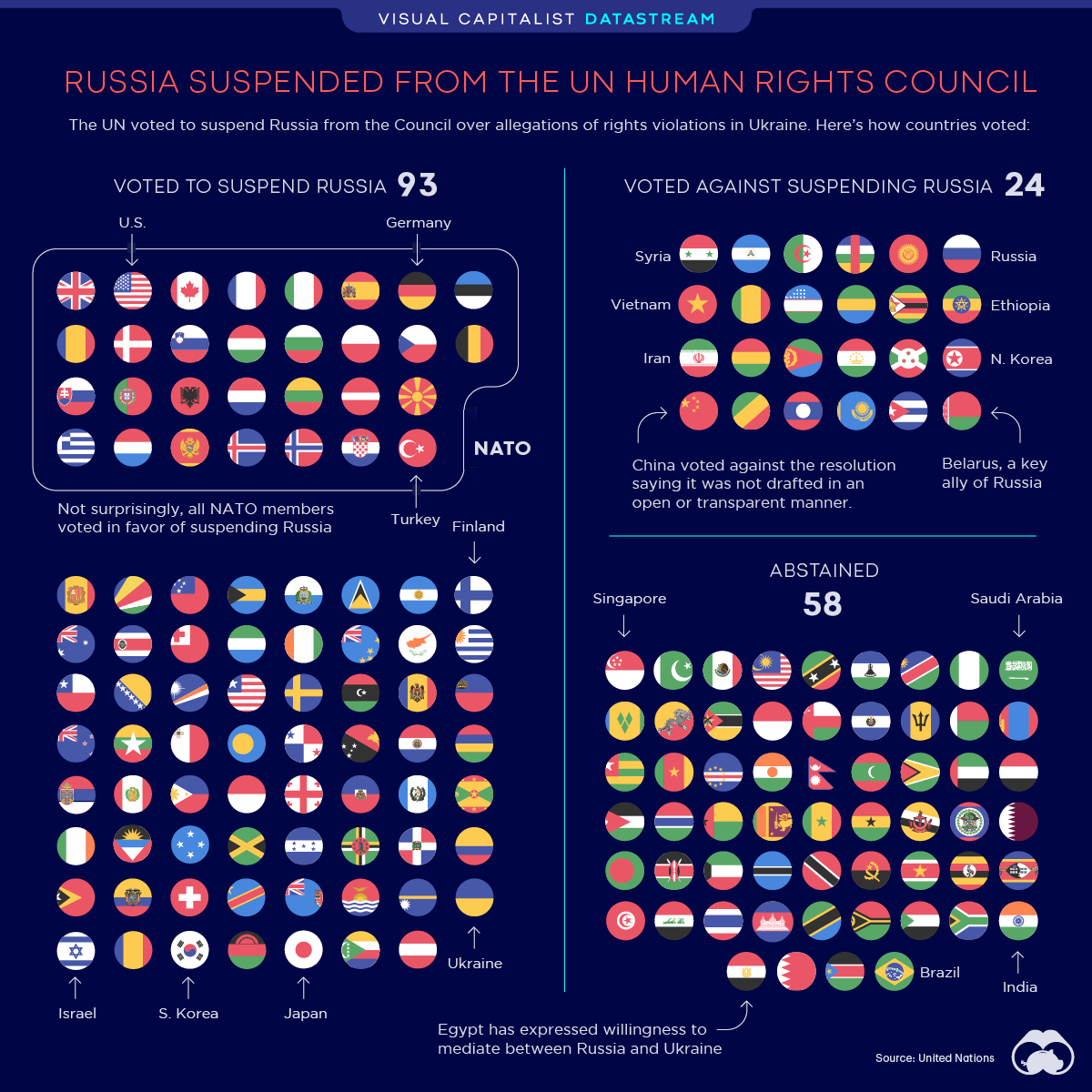
The Briefing
- 93 countries voted in favor of suspending Russia from the UN’s Human Rights Council, including all NATO member countries
- 24 countries voted against the resolution, including; China, Iran, and North Korea
Russia Has Been Suspended From the UN Human Rights Council
On April 7, 2022, the United Nations suspended Russia from its seat on the Human Rights Council.
This suspension comes amid growing condemnation of Russia over alleged civilian murders committed by Russian troops in Ukraine. Widely distributed videos appear to show the bodies of civilians scattered along the streets in the Ukrainian town of Bucha.
To be approved, the resolution required a two-thirds majority of assembly members that vote “yes” or “no”. Here is a complete list of how countries voted:
| Country | Vote | NATO Member | Former Soviet Union |
|---|---|---|---|
| 🇦🇩 Andorra | In favor | ||
| 🇦🇫 Afghanistan | -- | ||
| 🇦🇬 Antigua and Barbuda | In favor | ||
| 🇦🇱 Albania | In favor | ||
| 🇦🇲 Armenia | -- | ||
| 🇦🇴 Angola | Abstained | ||
| 🇦🇷 Argentina | In favor | ||
| 🇦🇹 Austria | In favor | ||
| 🇦🇺 Australia | In favor | ||
| 🇦🇿 Azerbaijan | -- | ||
| 🇧🇧 Barbados | Abstained | ||
| 🇧🇩 Bangladesh | Abstained | ||
| 🇧🇪 Belgium | In favor | ||
| 🇧🇫 Burkina Faso | -- | ||
| 🇧🇬 Bulgaria | In favor | ||
| 🇧🇭 Bahrain | Abstained | ||
| 🇧🇮 Burundi | Against | ||
| 🇧🇯 Benin | -- | ||
| 🇧🇳 Brunei Darussalam | Abstained | ||
| 🇧🇴 Bolivia | Against | ||
| 🇧🇷 Brazil | Abstained | ||
| 🇧🇸 Bahamas | In favor | ||
| 🇧🇹 Bhutan | Abstained | ||
| 🇧🇼 Botswana | Abstained | ||
| 🇧🇾 Belarus | Against | ||
| 🇧🇿 Belize | Abstained | ||
| 🇨🇦 Canada | In favor | ||
| 🇨🇩 Dem. Republic of the Congo | In favor | ||
| 🇨🇫 Central African Republic | Against | ||
| 🇨🇬 Republic of the Congo | Against | ||
| 🇨🇭 Switzerland | In favor | ||
| 🇨🇮 Côte d’Ivoire | In favor | ||
| 🇨🇱 Chile | In favor | ||
| 🇨🇲 Cameroon | Abstained | ||
| 🇨🇳 China | Against | ||
| 🇨🇴 Colombia | In favor | ||
| 🇨🇷 Costa Rica | In favor | ||
| 🇨🇺 Cuba | Against | ||
| 🇨🇻 Cabo Verde | Abstained | ||
| 🇨🇾 Cyprus | In favor | ||
| 🇨🇿 Czech Republic | In favor | ||
| 🇩🇪 Germany | In favor | ||
| 🇩🇯 Djibouti | -- | ||
| 🇩🇰 Denmark | In favor | ||
| 🇩🇲 Dominica | In favor | ||
| 🇩🇴 Dominican Republic | In favor | ||
| 🇩🇿 Algeria | Against | ||
| 🇪🇨 Ecuador | In favor | ||
| 🇪🇪 Estonia | In favor | ||
| 🇪🇬 Egypt | Abstained | ||
| 🇪🇷 Eritrea | Against | ||
| 🇪🇸 Spain | In favor | ||
| 🇪🇹 Ethiopia | Against | ||
| 🇫🇮 Finland | In favor | ||
| 🇫🇯 Fiji | In favor | ||
| 🇫🇲 Micronesia | In favor | ||
| 🇫🇷 France | In favor | ||
| 🇬🇦 Gabon | Against | ||
| 🇬🇩 Grenada | In favor | ||
| 🇬🇪 Georgia | In favor | ||
| 🇬🇭 Ghana | Abstained | ||
| 🇬🇲 Gambia | Abstained | ||
| 🇬🇳 Guinea | -- | ||
| 🇬🇶 Equatorial Guinea | -- | ||
| 🇬🇷 Greece | In favor | ||
| 🇬🇹 Guatemala | In favor | ||
| 🇬🇼 Guinea-Bissau | Abstained | ||
| 🇬🇾 Guyana | Abstained | ||
| 🇭🇳 Honduras | In favor | ||
| 🇭🇷 Croatia | In favor | ||
| 🇭🇹 Haiti | In favor | ||
| 🇭🇺 Hungary | In favor | ||
| 🇮🇩 Indonesia | Abstained | ||
| 🇮🇪 Ireland | In favor | ||
| 🇮🇱 Israel | In favor | ||
| 🇮🇳 India | Abstained | ||
| 🇮🇶 Iraq | Abstained | ||
| 🇮🇷 Iran | Against | ||
| 🇮🇸 Iceland | In favor | ||
| 🇮🇹 Italy | In favor | ||
| 🇯🇲 Jamaica | In favor | ||
| 🇯🇴 Jordan | Abstained | ||
| 🇯🇵 Japan | In favor | ||
| 🇰🇪 Kenya | Abstained | ||
| 🇰🇬 Kyrgyzstan | Against | ||
| 🇰🇭 Cambodia | Abstained | ||
| 🇰🇮 Kiribati | In favor | ||
| 🇰🇲 Comoros | In favor | ||
| 🇰🇳 Saint Kitts and Nevis | Abstained | ||
| 🇰🇵 North Korea | Against | ||
| 🇰🇷 South Korea | In favor | ||
| 🇰🇼 Kuwait | Abstained | ||
| 🇰🇿 Kazakhstan | Against | ||
| 🇱🇦 Laos | Against | ||
| 🇱🇧 Lebanon | -- | ||
| 🇱🇨 Saint Lucia | In favor | ||
| 🇱🇮 Liechtenstein | In favor | ||
| 🇱🇰 Sri Lanka | Abstained | ||
| 🇱🇷 Liberia | In favor | ||
| 🇱🇸 Lesotho | Abstained | ||
| 🇱🇹 Lithuania | In favor | ||
| 🇱🇺 Luxembourg | In favor | ||
| 🇱🇻 Latvia | In favor | ||
| 🇱🇾 Libya | In favor | ||
| 🇲🇦 Morocco | -- | ||
| 🇲🇨 Monaco | In favor | ||
| 🇲🇩 Moldova | In favor | ||
| 🇲🇪 Montenegro | In favor | ||
| 🇲🇬 Madagascar | Abstained | ||
| 🇲🇭 Marshall Islands | In favor | ||
| 🇲🇰 North Macedonia | In favor | ||
| 🇲🇱 Mali | Against | ||
| 🇲🇲 Myanmar | In favor | ||
| 🇲🇳 Mongolia | Abstained | ||
| 🇲🇷 Mauritania | -- | ||
| 🇲🇹 Malta | In favor | ||
| 🇲🇺 Mauritius | In favor | ||
| 🇲🇻 Maldives | Abstained | ||
| 🇲🇼 Malawi | In favor | ||
| 🇲🇽 Mexico | Abstained | ||
| 🇲🇾 Malaysia | Abstained | ||
| 🇲🇿 Mozambique | Abstained | ||
| 🇳🇦 Namibia | Abstained | ||
| 🇳🇪 Niger | Abstained | ||
| 🇳🇬 Nigeria | Abstained | ||
| 🇳🇮 Nicaragua | Against | ||
| 🇳🇱 Netherlands | In favor | ||
| 🇳🇴 Norway | In favor | ||
| 🇳🇵 Nepal | Abstained | ||
| 🇳🇷 Nauru | In favor | ||
| 🇳🇿 New Zealand | In favor | ||
| 🇴🇲 Oman | Abstained | ||
| 🇵🇦 Panama | In favor | ||
| 🇵🇪 Peru | In favor | ||
| 🇵🇬 Papua New Guinea | In favor | ||
| 🇵🇭 Philippines | In favor | ||
| 🇵🇰 Pakistan | Abstained | ||
| 🇵🇱 Poland | In favor | ||
| 🇵🇹 Portugal | In favor | ||
| 🇵🇼 Palau | In favor | ||
| 🇵🇾 Paraguay | In favor | ||
| 🇶🇦 Qatar | Abstained | ||
| 🇷🇴 Romania | In favor | ||
| 🇷🇸 Serbia | In favor | ||
| 🇷🇺 Russia | Against | ||
| 🇷🇼 Rwanda | -- | ||
| 🇸🇦 Saudi Arabia | Abstained | ||
| 🇸🇧 Solomon Islands | -- | ||
| 🇸🇨 Seychelles | In favor | ||
| 🇸🇩 Sudan | Abstained | ||
| 🇸🇪 Sweden | In favor | ||
| 🇸🇬 Singapore | Abstained | ||
| 🇸🇮 Slovenia | In favor | ||
| 🇸🇰 Slovakia | In favor | ||
| 🇸🇱 Sierra Leone | In favor | ||
| 🇸🇲 San Marino | In favor | ||
| 🇸🇳 Senegal | Abstained | ||
| 🇸🇴 Somalia | -- | ||
| 🇸🇷 Suriname | Abstained | ||
| 🇸🇸 South Sudan | Abstained | ||
| 🇸🇹 Sao Tome and Principe | -- | ||
| 🇸🇻 El Salvador | Abstained | ||
| 🇸🇾 Syria | Against | ||
| 🇸🇿 Eswatini | Abstained | ||
| 🇹🇩 Chad | In favor | ||
| 🇹🇬 Togo | Abstained | ||
| 🇹🇭 Thailand | Abstained | ||
| 🇹🇯 Tajikistan | Against | ||
| 🇹🇱 Timor Leste | In favor | ||
| 🇹🇲 Turkmenistan | -- | ||
| 🇹🇳 Tunisia | Abstained | ||
| 🇹🇴 Tonga | In favor | ||
| 🇹🇷 Turkey | In favor | ||
| 🇹🇹 Trinidad and Tobago | Abstained | ||
| 🇹🇻 Tuvalu | In favor | ||
| 🇹🇿 Tanzania | Abstained | ||
| 🇺🇦 Ukraine | In favor | ||
| 🇺🇬 Uganda | Abstained | ||
| 🇦🇪 United Arab Emirates | Abstained | ||
| 🇬🇧 United Kingdom | In favor | ||
| 🇺🇸 United States | In favor | ||
| 🇺🇾 Uruguay | In favor | ||
| 🇺🇿 Uzbekistan | Against | ||
| 🇻🇨 St Vincent and the Grenadines | Abstained | ||
| 🇻🇪 Venezuela | -- | ||
| 🇻🇳 Vietnam | Against | ||
| 🇻🇺 Vanuatu | Abstained | ||
| 🇼🇸 Samoa | In favor | ||
| 🇾🇪 Yemen | Abstained | ||
| 🇿🇦 South Africa | Abstained | ||
| 🇿🇲 Zambia | -- | ||
| 🇿🇼 Zimbabwe | Against | ||
| 🏴 Bosnia and Herzegovina | In favor |
Not surprisingly, all NATO countries voted in favor of suspending Russia from the Council. This includes Turkey, which has taken a more neutral stance than other allies since the invasion began. Altogether, 93 countries voted for the resolution.
On the other side, 24 countries voted against the resolution. China is perhaps the most significant “no” vote, citing a lack of openness and transparency in the process. Of course, Russia itself voted against the resolution.
A number of countries abstained from voting, most notably, India. Leading up to the vote, Moscow indicated that even an abstention would be viewed as an “unfriendly gesture” with consequences for bilateral ties.
This suspension adds to the list of actions taken against Russia—including heavy sanctions—as the country becomes more isolated from the international community—particularly Western nations.
What Does the UN Human Rights Council Do?
The United Nations Human Rights Council (UNHRC) is a UN body whose mission is to promote and protect human rights around the world.
The Council investigates breaches of human rights in UN member states and member countries address big picture human rights issues.
How Does the UN Human Rights Council Work?
The Council consists of 47 members, elected yearly by the General Assembly for staggered three-year terms.
Using the UN regional grouping system, members are selected to represent a diverse and fair mix of countries from around the world. Until its suspension, Russia was one of the two countries representing Eastern Europe, along with Ukraine.
Members are eligible for re-election for one additional term, after which they relinquish their seat.
Where does this data come from?
Source: The United Nations
Correction: An earlier version of this graphic had a Colombian flag in the “abstain” section. It has been replaced with the correct flag, Cambodia. Austria was also erroneously grouped with NATO countries.
Datastream
Can You Calculate Your Daily Carbon Footprint?
Discover how the average person’s carbon footprint impacts the environment and learn how carbon credits can offset your carbon footprint.

The Briefing
- A person’s carbon footprint is substantial, with activities such as food consumption creating as much as 4,500 g of CO₂ emissions daily.
- By purchasing carbon credits from Carbon Streaming Corporation, you can offset your own emissions and fund positive climate action.
Your Everyday Carbon Footprint
While many large businesses and countries have committed to net-zero goals, it is essential to acknowledge that your everyday activities also contribute to global emissions.
In this graphic, sponsored by Carbon Streaming Corporation, we will explore how the choices we make and the products we use have a profound impact on our carbon footprint.
Carbon Emissions by Activity
Here are some of the daily activities and products of the average person and their carbon footprint, according to Clever Carbon.
| Household Activities & Products | CO2 Emissions (g) |
|---|---|
| 💡 Standard Light Bulb (100 watts, four hours) | 172 g |
| 📱 Mobile Phone Use (195 minutes per day)* | 189 g |
| 👕 Washing Machine (0.63 kWh) | 275 g |
| 🔥 Electric Oven (1.56 kWh) | 675 g |
| ♨️ Tumble Dryer (2.5 kWh) | 1,000 g |
| 🧻 Toilet Roll (2 ply) | 1,300 g |
| 🚿 Hot Shower (10 mins) | 2,000 g |
| 🚙 Daily Commute (one hour, by car) | 3,360 g |
| 🍽️ Average Daily Food Consumption (three meals of 600 calories) | 4,500 g |
| *Phone use based on yearly use of 69kg per the source, Reboxed | |
Your choice of transportation plays a crucial role in determining your carbon footprint. For instance, a 15 km daily commute to work on public transport generates an average of 1,464 g of CO₂ emissions. Compared to 3,360 g—twice the volume for a journey the same length by car.
By opting for more sustainable modes of transport, such as cycling, walking, or public transportation, you can significantly reduce your carbon footprint.
Addressing Your Carbon Footprint
One way to compensate for your emissions is by purchasing high-quality carbon credits.
Carbon credits are used to help fund projects that avoid, reduce or remove CO₂ emissions. This includes nature-based solutions such as reforestation and improved forest management, or technology-based solutions such as the production of biochar and carbon capture and storage (CCS).
While carbon credits offer a potential solution for individuals to help reduce global emissions, public awareness remains a significant challenge. A BCG-Patch survey revealed that only 34% of U.S. consumers are familiar with carbon credits, and only 3% have purchased them in the past.
About Carbon Streaming
By financing the creation or expansion of carbon projects, Carbon Streaming Corporation secures the rights to future carbon credits generated by these sustainable projects. You can then purchase these carbon credits to help fund climate solutions around the world and compensate for your own emissions.
Ready to get involved?
>> Learn more about purchasing carbon credits at Carbon Streaming
-
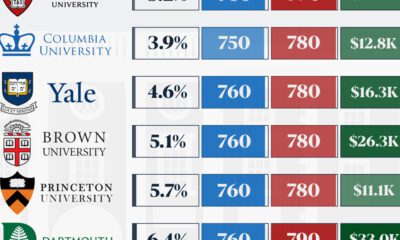
 Education1 week ago
Education1 week agoHow Hard Is It to Get Into an Ivy League School?
-

 Technology2 weeks ago
Technology2 weeks agoRanked: Semiconductor Companies by Industry Revenue Share
-

 Markets2 weeks ago
Markets2 weeks agoRanked: The World’s Top Flight Routes, by Revenue
-

 Demographics2 weeks ago
Demographics2 weeks agoPopulation Projections: The World’s 6 Largest Countries in 2075
-

 Markets2 weeks ago
Markets2 weeks agoThe Top 10 States by Real GDP Growth in 2023
-

 Demographics2 weeks ago
Demographics2 weeks agoThe Smallest Gender Wage Gaps in OECD Countries
-

 Economy2 weeks ago
Economy2 weeks agoWhere U.S. Inflation Hit the Hardest in March 2024
-

 Green2 weeks ago
Green2 weeks agoTop Countries By Forest Growth Since 2001
